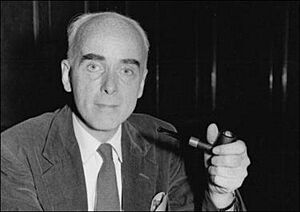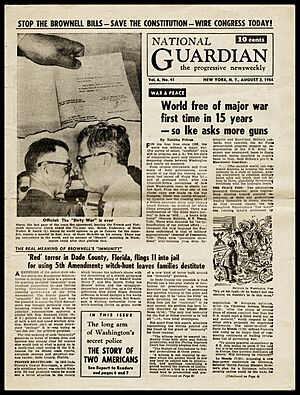Cedric Belfrage facts for kids
Quick facts for kids
Cedric H. Belfrage
|
|
|---|---|
 |
|
| Born | Cedric Henning Belfrage 8 November 1904 Marylebone, London |
| Died | 21 June 1990 (aged 85) Cuernavaca, Mexico |
| Occupation | Film critic, journalist, writer, political activist |
| Nationality | British |
| Alma mater | Corpus Christi College, Cambridge |
| Spouse |
Virginia Bradford
(m. 1928; div. 1930)Molly Castle
(m. 1936; div. 1953)Mary Bernick
(m. 1960) |
| Partner | Anne-Marie Hertz |
| Children | Sally Belfrage, Nicolas Belfrage; Anne Hertz (Zribi) |
| Relatives | Sydney Henning Belfrage (father) Bruce Belfrage (brother) Bryan Powley (uncle) |
Cedric Henning Belfrage (born November 8, 1904 – died June 21, 1990) was a British film critic, journalist, writer, and activist. He is best known for helping to start a newspaper in the United States called National Guardian. This paper shared different political ideas. Later, some US intelligence reports suggested he might have been working for the Soviet Union. However, other information shows he might have been a double agent, secretly working for British intelligence at the same time.
Contents
Early Life and Career
Cedric Belfrage was born in London, England, on November 8, 1904. He went to Gresham's School and then to Corpus Christi College at Cambridge. He even had the same room that the famous writer Christopher Marlowe used centuries ago!
While still a student, Cedric started writing about movies in 1924. In 1927, he moved to Hollywood, USA. There, he wrote for newspapers like the New York Sun and Film Weekly. He returned to London in 1930 to work for film producer Sam Goldwyn.
Back in Hollywood, Cedric became interested in politics. He joined the Hollywood Anti-Nazi League, a group against the Nazis. He also helped edit a magazine called The Clipper, which shared left-wing ideas. He liked the United States so much that he started the process to become a citizen in 1937.
Cedric joined the Communist Party USA for a short time in 1937. He later left the party but remained friendly with people who believed in socialism. He felt that being a "fellow traveler" – someone who supported socialist ideas but wasn't a formal party member – suited him better. He believed the Communist Party was important for the radical movement.
World War II Efforts
During World War II, Cedric Belfrage worked for the British Security Coordination in the Western part of the world. After Nazi Germany was defeated, he became a "press control officer." His job was to help restart newspapers in Germany.
He and his team found buildings and equipment for new, democratic newspapers. They also made sure that people who had supported the Nazis were not allowed to work in the new German newspaper industry.
In Germany, Cedric met James Aronson, another journalist. They became friends and worked together to start new newspapers in several German cities. They even started thinking about launching a new newspaper in the United States after the war.
Starting the National Guardian
In 1948, Cedric Belfrage, along with James Aronson and John T. McManus, started a new weekly newspaper called the National Guardian. This paper focused on different political views. Cedric worked with this publication for many years. It was later renamed The Guardian in 1967.
Life in Later Years
During a time in the 1950s known as McCarthyism, many people in the US were very suspicious of anyone thought to be a communist. In 1953, Cedric was called to speak before a government group called the House Un-American Activities Committee (HUAC). In 1955, he was sent back to England. His wife, Molly Castle, had also been sent back earlier.
Cedric traveled to Cuba in 1961. In 1962, he explored South America and eventually settled in Cuernavaca, Mexico.
He returned to the US in 1973 to promote his new book, The American Inquisition. Cedric also became a translator, turning books from Spanish into English. He notably translated Open Veins of Latin America by the Latin American author Eduardo Galeano. Cedric continued to write a lot until his final years.
Intelligence Information
According to files from the FBI, Cedric Belfrage was questioned in 1947 about his connections to the Communist Party.
Later, in 1995, secret messages from the Soviet Union were decoded by a project called Venona. This project was a joint effort between US and British intelligence. These decoded messages suggested that a person with the codename "Unnamed Codename Number 9" (UNC/9) might have been Cedric Belfrage.
A Soviet document from 1948 also suggested that Cedric had a secret connection with Soviet intelligence. However, during this time, the United States and the Soviet Union were allies in World War II. At the same time, the Soviet Union also had a spy network.
Family Life
Cedric and his wife, Molly Castle, had two children: Sally and Nicolas. He also had another child, Anne Hertz (Zribi), with his partner Anne-Marie Hertz. Cedric was the younger brother of Bruce Belfrage, who was an actor and a newsreader for the BBC. His uncle, Bryan Powley, was an actor who started his career in silent movies.
Death
Cedric Belfrage passed away on June 21, 1990, in Mexico. He was 85 years old.
Recent Information
In 2015, historian Christopher Andrew looked at newly released documents from the UK National Archive. These documents suggested that Cedric Belfrage worked for the British secret service (Secret Intelligence Service or MI6) during the war. They also suggested he spied for the Soviet Union. Some news reports even called him a "sixth man," linking him to the famous Cambridge Five spy ring.
However, a BBC radio show in 2015 also shared information from historian John Simkin. This information suggested that Cedric Belfrage was actually working as a double agent for British Security Co-ordination. This means he might have been giving information to the Soviets as part of his work for the British.
Books by Cedric Belfrage
- Away From It All: An Escapologist's Notebook. 1937.
- Promised Land: Notes For a History. 1937.
- Let My People Go. 1937.
- South of God. 1938.
- A Faith to Free the People. 1942.
- They All Hold Swords. 1941.
- Abide With Me. 1948.
- Seeds of destruction; the truth about the U.S. occupation of Germany. 1954.
- The Frightened Giant. 1956.
- My Master Columbus. 1961.
- The Man at the Door With the Gun. 1963.
- The American Inquisition. 1973.
- Something to Guard: The Stormy Life of the National Guardian, 1948-1967. With James Aronson. 1978.
 | Percy Lavon Julian |
 | Katherine Johnson |
 | George Washington Carver |
 | Annie Easley |


